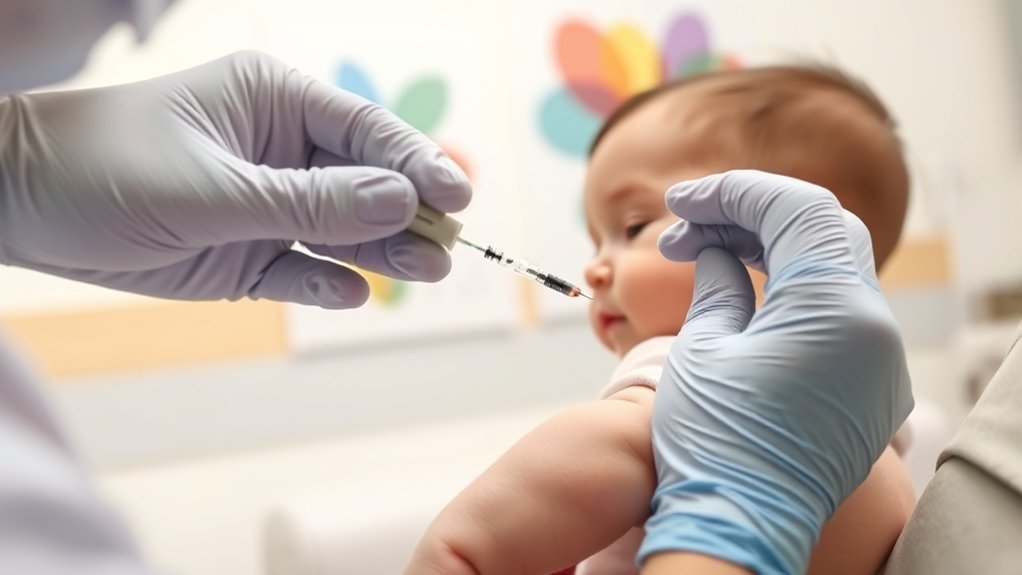When it comes to protecting your child from rotavirus, understanding the importance of vaccination is essential. This virus can cause severe gastrointestinal illness in young children, leading to dehydration and hospitalization. By ensuring your child receives the rotavirus vaccine on schedule, you can greatly reduce their risk of infection. But vaccination alone isn’t enough. There are additional measures you can take to keep your child healthy and mitigate the spread of this virus.
Understanding Rotavirus and Its Impact on Children
Understanding rotavirus and its impact on children is essential for parents and caregivers, especially since this virus is one of the leading causes of severe diarrhea among young children worldwide.
Rotavirus spreads easily through contaminated hands, surfaces, and food. Symptoms typically include watery diarrhea, vomiting, fever, and abdominal pain, which can lead to dehydration—a serious concern for young ones. In fact, dehydration can require hospitalization if not managed promptly.
Most children will experience rotavirus at least once by age five, making it vital to recognize the signs early. Ensuring your child stays hydrated and monitoring their symptoms can mitigate risks.
Awareness of rotavirus helps you take proactive measures to protect your child’s health and well-being during peak seasons of infection.
Importance of the Rotavirus Vaccine
Vaccination plays an essential role in protecting against rotavirus, greatly reducing the incidence of severe illness in young children. By getting your child vaccinated, you help prevent dehydration and hospitalizations related to rotavirus infections, which can lead to serious complications.
The vaccine is safe and effective, offering your child immunity against the most common strains of the virus. Studies show that vaccinated children are considerably less likely to experience severe diarrhea and vomiting, which can disrupt daily life and lead to emergency care.
Additionally, widespread vaccination contributes to herd immunity, protecting those who can’t be vaccinated, such as infants and individuals with weakened immune systems. Prioritizing the rotavirus vaccine is a proactive step toward safeguarding your child’s health.
Vaccination Schedule and Recommendations
To guarantee your child receives ideal protection against rotavirus, it’s vital to follow the recommended vaccination schedule.
The rotavirus vaccine is typically given in two or three doses, depending on the specific vaccine your healthcare provider uses. The first dose should be administered between 2 to 6 months of age, with subsequent doses following at specified intervals.
It’s important to complete the series by age 8 months to guarantee maximum effectiveness. Delaying vaccinations could increase the risk of rotavirus infection, which can lead to severe dehydration and hospitalization.
Always consult your pediatrician for personalized recommendations and to discuss any concerns. Staying on schedule not only protects your child but also helps prevent the spread of rotavirus in the community.
Recognizing Symptoms of Rotavirus Infection
Even with a complete vaccination schedule, it’s still important to recognize the symptoms of a rotavirus infection, as breakthrough cases can occur.
Knowing what to watch for can help you act quickly. Here are the key symptoms to look out for:
- Severe Diarrhea: Watery stools that can occur up to 10 times a day.
- Vomiting: Frequent vomiting can lead to dehydration, which is a serious concern.
- Fever and Abdominal Pain: A low-grade fever and cramping may accompany gastrointestinal symptoms.
If you notice these signs, especially in young children, seeking medical attention promptly can prevent complications.
Being aware of these symptoms empowers you to take the necessary steps to keep your child healthy.
Additional Preventative Measures to Keep Kids Healthy
While vaccination is vital, there are additional steps you can take to further protect your child from rotavirus and other illnesses.
First, make sure your child practices good hand hygiene. Teach them to wash their hands with soap and water, especially after using the restroom and before meals. This simple habit can greatly reduce infection risk.
Next, keep surfaces clean and sanitized, particularly in high-traffic areas. Rotavirus can survive on surfaces, so regular cleaning is essential.
Also, promote a healthy diet rich in fruits, vegetables, and whole grains to boost their immune system.
Finally, encourage adequate hydration, especially during illness, to prevent dehydration.
Frequently Asked Questions
Can Adults Get Infected With Rotavirus as Well?
Yes, adults can get infected with rotavirus, although it’s more common in children. If you’re exposed, you might experience mild symptoms, but severe illness is rare. Practicing good hygiene can help reduce your risk.
Are There Any Side Effects of the Rotavirus Vaccine?
Yes, the rotavirus vaccine can cause mild side effects like fever, irritability, or diarrhea. Serious side effects are rare. Always consult your healthcare provider if you have concerns about vaccination and its potential effects on your child.
How Long Does Immunity Last After Vaccination?
Immunity from the rotavirus vaccine typically lasts for several years, but it may start to decrease over time. Regular check-ups can help guarantee continued protection and identify if further vaccinations are needed.
Is There a Treatment for Rotavirus Infection?
There isn’t a specific treatment for rotavirus infection, but you can manage symptoms with hydration and electrolyte solutions. Most cases resolve on their own, so focus on keeping yourself or your child comfortable.
Can the Rotavirus Vaccine Be Given With Other Vaccines?
Imagine a shield protecting your child from illness. Yes, the rotavirus vaccine can be given alongside other vaccines, ensuring thorough protection. Always consult your healthcare provider for tailored advice to optimize your child’s vaccination schedule.
Conclusion
In summary, protecting your child from rotavirus is essential, as this virus causes severe diarrhea in about 1 in 5 children under five. By ensuring they receive the rotavirus vaccine on schedule and practicing good hygiene, you can greatly reduce their risk of infection. Remember, a balanced diet and proper hydration also play an important role in maintaining their health. Together, these steps can help keep your little ones safe and thriving during their early years.
